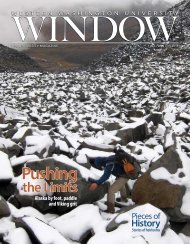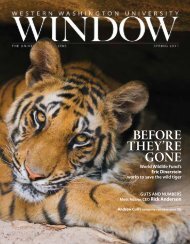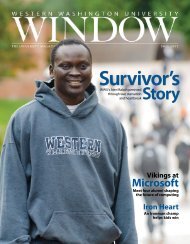WINDOW
Gratitude - WINDOW - The magazine for WWU
Gratitude - WINDOW - The magazine for WWU
- No tags were found...
You also want an ePaper? Increase the reach of your titles
YUMPU automatically turns print PDFs into web optimized ePapers that Google loves.
Mike Town’s<br />
AWARD LIST KEEPS<br />
GROWING<br />
Spada Lake<br />
INDEX<br />
Sultan River<br />
WILD SKY<br />
WILDERNESS<br />
N. Fork Skykomish River<br />
Troublesome<br />
Creek<br />
Campground<br />
SKYKOMISH<br />
Above: The 106-acre Wild Sky Wilderness<br />
is a “back-door” preserve in eastern<br />
Snohomish County. The area contains a<br />
low-level watershed, the type of forest<br />
that hasn’t typically been protected in<br />
the past.<br />
Beckler River<br />
0 5<br />
MILES<br />
Stevens<br />
Pass<br />
2<br />
WASHINGTON<br />
Left: Mike Town holds the Green Prize in Public Education, a ceramic<br />
bowl by artist Lisa Gluckin, who fires her pottery in a kin fueled<br />
by methane gases captured from a local landfill. Photo by Jason<br />
Rothkowitz/NEA Foundation.<br />
Above: Mike Town campaigned for nine years to urge Congress to<br />
create the Wild Sky Wilderness, the state’s first federal wilderness area in<br />
24 years. Photo by Josie Liming<br />
Right: Town, right, shows part of the Wild Sky Wilderness to U.S. Rep.<br />
Rick Larsen and U.S. Sen. Patty Murray in May 2008 soon after the<br />
watershed gained federal wilderness protection. Photo by Dan Bates/<br />
The Herald of Everett<br />
Town didn’t start off as a<br />
model student – more like<br />
one of the middle-of-thepack<br />
kids he recruits into his<br />
AP science classes.<br />
Continued from page 20.<br />
engrossed him was the interdisciplinary, problem-solving<br />
approach of Huxley, very different than traditional science<br />
departments. Town helped research whether pulp mill waste<br />
from Bellingham’s Georgia-Pacific plant could make fertilizer,<br />
and then did his “problem series” research on the relationship<br />
between the pine beetle and the lodgepole pine it was<br />
devastating.<br />
Other professors who influenced him included Lynn<br />
Robbins, who taught courses in environmental policy and<br />
impact assessment, marine biologist Bert Webber, ecologist<br />
Tom Lacher and aquatic biologist Dave Brakke, then director of<br />
the Institute for Watershed Studies.<br />
Science, he learned, was hands-on, practical and worldchanging.<br />
He brought that lesson to Redmond High, where he<br />
developed a horticulture and later a forest ecology course at the<br />
peak of the spotted owl wars. Then he launched an Advanced<br />
Placement Environmental Science class so popular that almost<br />
half the student body takes the elective.<br />
Today, Town’s classroom lessons emphasize the threat of<br />
climate change, greenhouse gas pollution and ways to<br />
conserve energy or create green alternatives.<br />
“Ecology teaches the interrelationship of all the sciences,”<br />
he says. “Instead of abstract math, it’s concrete problem solving.<br />
When you understand how forest ecology works, it’s like seeing<br />
the woods with a different lens – seeing the forest for the trees.”<br />
Town also takes his work home. His solar array feeds so<br />
much energy into the electrical grid that he believes his home<br />
is now “carbon neutral,” generating as much electricity as it<br />
consumes. He worked on state legislation that requires utilities<br />
to pay more for home-grown electricity than they charge<br />
consumers, to help subsidize solar photovoltaic investments.<br />
He lobbied and campaigned for nine years to help create<br />
the new 106,000-acre Wild Sky Wilderness in Washington’s<br />
Cascade Mountains, a “back-door” preserve near Seattle and<br />
Is your school ready for the<br />
Cool School Challenge?<br />
Students in dozens of schools in Washington state<br />
and beyond have taken on Mike Town’s Cool School<br />
Challenge to enact plans to reduce their schools’<br />
carbon footprints. Now administered by the Puget<br />
Sound Clean Air Agency, the Cool School Challenge<br />
has spread to 80 schools in seven states and supplied<br />
training to more than 300 teachers. Learn more at<br />
www.coolschoolchallenge.org.<br />
See Mike Town discuss what inspired the<br />
Cool School Challenge at www.wwu.edu/window.<br />
Everett that is the state’s first new federal wilderness area in<br />
24 years. A low-elevation watershed, forests like this haven’t<br />
typically been protected in the past, Town says, which was why<br />
preserving this federal forestland was an ecological victory.<br />
Town has inspired many of his high school students to take<br />
their own actions to protect the environment. They have worked<br />
with local governments, gotten a Starbucks to change its waste<br />
stream, pushed Puget Sound Energy to promote conservation<br />
and renewable energy and won more than $20,000 in student<br />
envrionmental contests.<br />
Town has also persuaded many of his students to try<br />
Western and Huxley. As many as 40 students come to WWU<br />
each year from Redmond High, he says.<br />
“I talk Western up all the time,” he says, “especially the<br />
uniqueness of Huxley.”<br />
One suspects Mike Town would have done well regardless<br />
of his alma mater, but WWU was formative – the right pebble<br />
making ripples in the right pond.<br />
“Huxley was the right place at the right time for me,” he<br />
says. At Huxley, Town says, “I found something bigger than<br />
myself – the environment – and my passion got nurtured there.”<br />
William Dietrich is a graduate of WWU’s Fairhaven College<br />
of Interdisciplinary Studies and an assistant professor at Huxley<br />
College of the Environment. His profile of Mike Town will<br />
appear in the Huxley College history book, “Green Fire,” scheduled<br />
for publication in early 2011. The winner of the Pulitzer Prize<br />
for his coverage of the Exxon Valdez oil spill disaster, Dietrich<br />
is also an accomplished non-fiction author known for his work<br />
exploring Pacific Northwest ecosystems. When he’s not mentoring<br />
Environmental Journalism students at Huxley, he’s working on the<br />
next installment of his Ethan Gage Adventure series of novels.<br />
Mike Town’s reputation as an environmental educator<br />
has reached a national level. Earlier this spring,<br />
Town was awarded a $25,000 Green Prize in Public Education,<br />
the first award of its kind from the NEA Foundation.<br />
He used a portion of the money to double the<br />
solar photovoltaic panel array at his home that feeds<br />
electricity into the Puget Sound Energy grid.<br />
The awards keep piling up. He received the first ever<br />
Cox Conserves Hero award from Seattle’s KIRO 7-TV<br />
and the Trust for Public Land for his work establishing<br />
the new Wild Sky Wilderness near Skykomish, promptly<br />
donating the $5,000 to the Washington Wilderness<br />
Coalition he worked with. In 2004 he received the Amgen<br />
Award for Science Technology Excellence from the<br />
world’s largest biotechnology company. In 2009, he<br />
received the Golden Apple award from PEMCO Insurance<br />
and donated the award money to economically<br />
disadvantaged students at Redmond High. And five of<br />
Town’s students received the Presidential Youth Award<br />
in the White House Rose Garden in 2008 for their work<br />
reducing Redmond High School’s carbon footprint.<br />
Western’s education of Mike Town more than a<br />
quarter century ago can’t be given all the credit. But<br />
the science teacher does say the integrated research<br />
on the mountain pine beetle he did at Huxley in the<br />
early 1980s taught him the interconnectedness of environmental<br />
systems and human activities, a synthesis<br />
he uses in his own classroom to excite students.<br />
22 <strong>WINDOW</strong> • Fall 2010 • Western Washington University<br />
www.wwu.edu/window<br />
23








